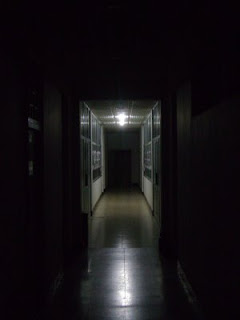I have eaten with nothing but chopsticks since I arrived in
Me and the sticks, we have a love/hate relationship. Although I’ve been lucky enough to have had what I considered plenty of experience with chopsticks before I can to
I am what I’d like to think of as a “vigorous eater.” I enjoy food, and frequently eat it entirely too fast. What I appreciate about chopsticks is their ability to slow my meals down, whether I like it or not. Many Chinese have mastered the art of using them to essentially bulldoze their breakfasts and lunches down the hatch as quickly as possible, particularly when they’re eating alone. Dinner time is more often a more casual, protracted meal that involves conversation and a more deliberate, less vacuum-like approach. My problem is that not only do chopsticks slow me down in the dining hall, but they dramatically increase the amount of time it takes to do laundry every week.
At first, I squeezed hard, both on the free-floating upper stick (which I used to hold with three fingers, and now hold with only two) and on the food that was pinned between. One in every ten bites would result in whatever I was holding spiraling out of my grip and onto my pants or shirt, back into my bowl, onto the floor, or, once, onto the plate of the person across from me. “Thank you!” they said politely, while laughing. Like with many things in
One week during office hours, I was talking about my eating problem with one of my students. I had told him that I was slowly beginning to learn the ropes, I thought, and he replied, “What ropes?” After laughingly explaining another idiom that continued to demonstrate to me how wacky the English language is, he laughed, mentioning how I probably haven’t had many noodle dishes yet. “Just wait until you get to the noodles,” he said. I had had one particular noodle dish before—niu rou chao mian, which is the basis for the Americanized “beef chow mein”—and said to him that I felt as if I had already mastered the noodles. “There are others, though” he said: “the wet ones.” Somewhere in the distance a bamboo flute must have been fluttering menacingly.
I arrived in the food court a couple of nights later intent on finding some of the noodles that were supposed to be able to kick my food-handling ass. This place has everything—hot pot, noodles, the best dumplings you’ll ever have, beer, orange drink, the whole nine—but I was searching then through the dim, hospital-like florescent light for a sign with the character for mian—noodles. Restaurants were arranged in stalls, and as you walked by fuwuyuan would hawk their wares aggressively, practically screaming at you to come try their fish or vegetables or whatever. Chinese folks sat all around me, shoveling. I looked on enviously, then made my way over to the stall with the most people crowded around it. It was, of course, the noodle shop.
I pointed to a picture of a bowl of noodles soaking in red broth with what looked like chunks of beef and potatoes floating in it. Despite every effort on the part of the photographer to make it look like prison food, the dish struck me as visually delicious, which usually translates into actually delicious in Chinese restaurants—usually. The poetic name for the noodle dish had the word for mountain (shan) printed in its title: “mountain noodles,” which sounded good enough for me. In t-minus three minutes I was presented with a steaming, not-quite-clean-looking bowl of goodness, along with a kind of hot, sweet ricewater soup/drink that actually contains a bit of alcohol in it. I would use this incredible concoction to cut the taste and heavinessof the inordinate amount of grease and oil coating the noodles after I was done.
Even though I was trying to move carefully over to an unoccupied green plastic seat, I was unable to keep all of the noodle broth in the bowl. I sat down and prepped—I unwrapped the sticks, split them, rapped them hard against the table (probably generating more splinters than I was discarding), and laid my napkin out in front of me, at the ready. Pridefully, I did not tuck it into my shirt, or lay it out on my lap. I was thinking a way that I thought a Chinese might try to think in such a situation: “Food belongs in your mouth, so put it in your mouth, not anywhere else. Why would you want to wipe your lap or shirt? Save the napkin for blowing your nose if it gets runny later on.”

I’ve found that dry cleaners located on the university’s campus seem to remember the “dry” but forget the “clean,” so a few days later I found myself sitting in my living room huddled over a washbasin with a bottle of Shout, recapping my defeat. I promised myself I would wear a cheap t-shirt and not one of my work shirts for Round Two.
There have been many subsequent rounds with the wet noodles. They are just too good to resist sometimes. Sometimes I rule the day, sometimes they win the field. Every time, the food is outstanding. Although I feel from time to time like the Gerber baby learning to eat again, I inevitably still eat with the exuberance of a small child here in














